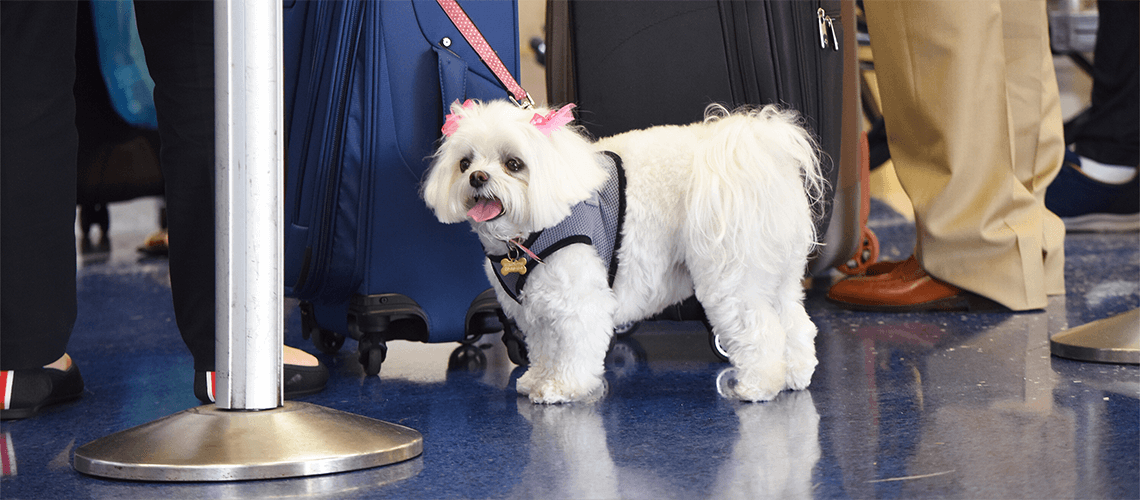If you have an Emotional Support Animal (ESA) to help you cope with stress or other mental health conditions, you might wonder, can you take emotional support animals anywhere? Unlike service animals, which are trained to perform specific tasks for people with disabilities, ESAs do not receive specialized training. This distinction influences where they can accompany you, and it can sometimes be confusing. Let’s explore where your ESA is welcome and the federal laws that protect your rights.
What Is an Emotional Support Animal?
An Emotional Support Animal, or ESA, provides comfort to people dealing with mental health issues such as anxiety, depression, or post-traumatic stress disorder (PTSD). Unlike service animals, ESAs are not required to perform specific tasks or receive special training. However, they can be a vital part of their owner’s mental health care.
To officially have an ESA, you need a letter from a licensed mental health professional (LMHP). This document confirms that your pet plays a role in your treatment plan. Thinking about getting your ESA letter? Start here.
What's the Difference Between Emotional Support Animals and Service Animals?
It’s important to differentiate between emotional support animals and service animals. Service animals, like guide dogs, receive training to perform specific tasks for individuals with disabilities. For example, a psychiatric service dog may assist someone with PTSD by interrupting panic attacks. These animals are protected under the Americans with Disabilities Act (ADA), allowing them access to most public places, including restaurants, stores, and hospitals.
Emotional support animals, on the other hand, are not trained to perform tasks and do not have the same rights as service animals. While service animals are recognized under the ADA, ESAs are protected by other laws, such as the Fair Housing Act (FHA) and the Air Carrier Access Act (ACAA). These laws help ensure that your ESA can live with you and, in some cases, travel with you.
Can You Get Housing for Emotional Support Animals?
A significant benefit of having an ESA is the protection offered under the Fair Housing Act (FHA). This law requires landlords to make reasonable accommodations for emotional support animals, even if the property has a “no pets” policy. If you have an ESA, you have the right to live with your pet without having to pay pet fees or deposits.
Landlords may ask for a letter from a licensed mental health professional to confirm your need for an ESA, but they cannot inquire about your specific mental health condition. Understanding your rights under the FHA can simplify the process of finding suitable housing for you and your ESA. Need to get an ESA letter? Start the process now.
Are Emotional Support Animals Allowed on Flights?
In the past, the Air Carrier Access Act (ACAA) allowed more flexibility for flying with ESAs. However, recent changes have made it more challenging. Most airlines no longer recognize ESAs as service animals, which might mean you have to pay pet fees, and your ESA may have to travel in the cargo hold or stay under your seat.
Some airlines still permit ESAs in the cabin, but this is becoming less common. Before booking a flight, it’s crucial to check with the airline about their current policies. You may need to provide a letter from a licensed mental health professional and meet other requirements.
Are Emotional Support Animals Allowed in Public Places?
A common question is whether emotional support animals can accompany you to public places like restaurants, stores, and hospitals. The answer is typically no. Since ESAs are not protected under the ADA, they do not have the same access rights as service animals. This means businesses can legally refuse entry to ESAs.
Some businesses may allow ESAs as a courtesy, but this varies. If you plan to bring your ESA to a public place, it’s a good idea to call ahead and ask about their policy. Hospitals often have stricter rules, particularly in patient areas, so always check with the hospital administration before bringing your ESA.
Having an official ESA letter can help ensure your animal is recognized. Get your ESA letter here.
Can Emotional Support Animals Be in Common Areas?
In housing situations, ESAs are generally allowed in common areas such as lobbies, hallways, and courtyards. The Fair Housing Act requires landlords to accommodate ESAs, which includes allowing access to shared spaces. However, your ESA should be well-behaved and not pose any threat to others. If your ESA causes damage or disruption, the landlord may have grounds to take action.
If you live in a building with common areas, it’s important to adhere to any pet-related rules and always clean up after your ESA. Being a responsible pet owner helps ensure that ESAs remain welcome.
Can Emotional Support Animals Live in College Dorms?
College students with ESAs may wonder about the rules for dorm living. The Fair Housing Act applies to college housing, meaning colleges and universities are generally required to accommodate ESAs in dormitories. However, each school may have its own procedures for approving ESAs.
To bring your ESA to college, you’ll need to provide a letter from a licensed mental health professional. Some schools may ask for additional paperwork or have specific rules about where your ESA can go on campus. Working closely with your school’s housing office can help you understand their policies.
Are Emotional Support Animals Allowed in Hotels or Airbnb?
Hotels and Airbnb rentals are not obligated to accept emotional support animals because ESAs are not considered service animals under the ADA, and the Fair Housing Act does not apply to short-term rentals. Nonetheless, some hotels and Airbnb hosts might be willing to accommodate ESAs.
When booking, it’s best to contact the property directly to ask about their ESA policy. Some places may allow ESAs but charge pet fees, while others may not permit them at all. Confirming the policy before your stay helps avoid surprises.
Are Emotional Support Animals Allowed in Schools and Colleges?
Rules for ESAs in educational settings vary. Public schools must adhere to the ADA, which requires them to accommodate service animals but not emotional support animals. However, colleges with on-campus housing must comply with the Fair Housing Act and may need to accommodate ESAs in dorms.
If you’re a student with an ESA, it’s important to be familiar with your school’s policies. Some institutions may allow ESAs in specific areas, while others might limit them to dorm rooms. Always check with your school’s administration for details.
If you’re a student who needs an ESA letter, get started here.
What Are the Restrictions on Emotional Support Animals?
While ESAs offer valuable support, there are limits to where they can go. Unlike service animals, ESAs don’t have unrestricted access to public places. This means there may be restrictions when taking your ESA to restaurants, stores, hospitals, and other locations.
It’s crucial to respect these boundaries and understand the difference between an ESA and a service animal. If you plan to bring your ESA with you, always check the specific place’s rules beforehand. Having the correct documentation, like an ESA letter, can assist in situations where accommodations are necessary.
What Are the Requirements for Emotional Support Animals?
To have an ESA, you need to have a mental health condition recognized by a licensed mental health professional. Your ESA must also be well-behaved and under your control at all times. While ESAs don’t need special training, they should not pose a threat or cause damage.
If you’re considering getting an ESA, it’s essential to understand the responsibilities involved. An ESA is not just a pet but a critical part of your mental health care. To make sure your ESA is recognized and protected, get your ESA letter today.
Conclusion
Emotional Support Animals provide crucial comfort and assistance to people with mental health issues. However, their access to public spaces is more limited compared to service animals. Knowing where your ESA can and cannot go is important for following the law and respecting others. With the right documentation and a clear understanding of your rights, you can enjoy the many benefits your ESA offers.






